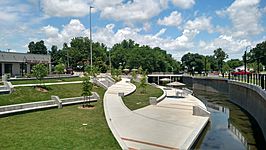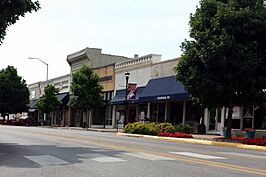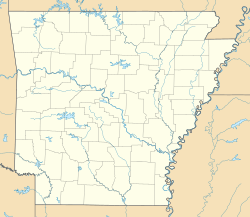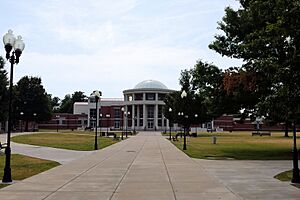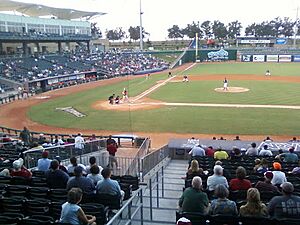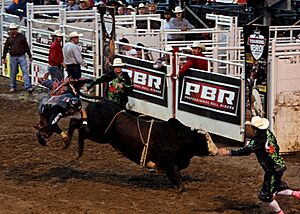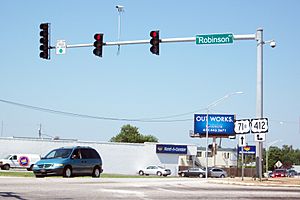Springdale, Arkansas facts for kids
Quick facts for kids
Springdale, Arkansas
|
||
|---|---|---|
|
Clockwise from top: Spring Creek runs through Turnbow Park, the Shiloh Museum of Ozark History, Northwest Arkansas Naturals play at Arvest Ballpark, historic commercial center of Springdale, Emma Avenue, the Tyson Foods World Headquarters, and Old Springdale High School
|
||
|
||
| Nickname(s):
The Poultry Capital Of The World
|
||
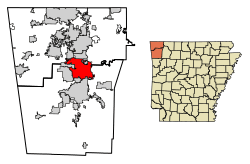
Location of Springdale in Benton County and Washington County, Arkansas.
|
||
| State | Arkansas | |
| Counties | Washington, Benton | |
| Founded | 1838 | |
| Government | ||
| • Type | Mayor-City council | |
| Area | ||
| • City | 49.70 sq mi (128.73 km2) | |
| • Land | 49.20 sq mi (127.42 km2) | |
| • Water | 0.51 sq mi (1.31 km2) | |
| Elevation | 1,335 ft (407 m) | |
| Population
(2020)
|
||
| • City | 87,672 | |
| • Density | 1,710.69/sq mi (660.50/km2) | |
| • Metro | 546,725 | |
| Time zone | UTC−6 (Central (CST)) | |
| • Summer (DST) | UTC−5 (CDT) | |
| ZIP codes |
72762, 72764-72766
|
|
| Area code(s) | 479 | |
| FIPS code | 05-66080 | |
| GNIS feature ID | 2405509 | |
| NWA metro population as of 2019 | ||
Springdale is a big city in Arkansas, USA. It's found in both Washington and Benton counties. These are in the northwest part of Arkansas. Springdale sits on the Springfield Plateau, deep within the Ozark Mountains. For a long time, it has been an important industrial city in the area.
Springdale is home to the main office of Tyson Foods. This company is the world's largest meat producer. The city was first called Shiloh. Its name changed to Springdale in 1872 when it applied for a post office. Springdale is part of the Northwest Arkansas Metropolitan Statistical Area. This area had about 546,725 people in 2020. In 2020, Springdale itself had a population of 84,161.
Springdale has grown a lot recently. Its population more than doubled between 1990 and 2010. During this fast growth, a campus of Northwest Arkansas Community College opened. Also, the Northwest Arkansas Naturals baseball team moved into Arvest Ballpark. Tyson Foods is still the city's biggest employer. Many places in Springdale are named after Tyson, like parks and schools. In 2013, the Governor of Arkansas officially called Springdale "The Poultry Capital Of The World."
Contents
History of Springdale
Springdale was first known as "Shiloh." This name came from the local Shiloh church. The town was officially planned under the name Shiloh in 1866. Then, in 1878, the town became a city and changed its name to Springdale.
In 2020, the people of Bethel Heights voted to join Springdale. This happened after their city's water plant had problems. Bethel Heights officially became part of Springdale on August 21, 2020.
A strong tornado hit Springdale on March 30, 2022. It damaged many buildings and injured seven people.
Geography of Springdale
Springdale covers about 49.7 square miles (128.7 square kilometers). Most of this area is land. A small part, about 0.5 square miles (1.3 square kilometers), is water. The city stretches north into southern Benton County. Springdale is next to several other cities. These include Cave Springs and Lowell to the north. To the west are Elm Springs and Tontitown. To the south are Johnson and Fayetteville.
The city is located where Interstate 49 (I-49) meets US Highway 62 and US Highway 71. This highway is the main route through the area. It replaced the older, winding US 71 in the 1990s. This new interstate connection has helped Springdale grow a lot.
Springdale's Landscape
Springdale is on the Springfield Plateau. This is part of The Ozarks, which stretch through northwest Arkansas. The rocks you see today, like limestone, were formed a very long time ago.
Northwest Arkansas Area
The Northwest Arkansas region includes three counties: Benton, Madison, and Washington. In 2000, about 347,045 people lived here. By 2010, this number grew to 463,204. This means the population increased by over 33%. Springdale is part of this growing area. It is bordered by other cities like Rogers to the north and Fayetteville to the south.
Springdale's Weather
Springdale has a humid subtropical climate. This means it has hot, humid summers. Winters are usually mild to cool. The weather is much like that in nearby Fayetteville.
July is the hottest month. The average high temperature is 89°F (32°C). The average low is 69°F (21°C). Temperatures above 100°F (38°C) are not common but happen about twice a year. January is the coldest month. The average high is 46°F (8°C). The average low is 26°F (-3°C). The highest temperature ever recorded was 111°F (44°C) in 1954. The lowest was -24°F (-31°C) in 1899. Springdale gets rain throughout the year, with more rain in spring and fall.
People of Springdale
| Historical population | |||
|---|---|---|---|
| Census | Pop. | %± | |
| 1880 | 249 | — | |
| 1890 | 1,146 | 360.2% | |
| 1900 | 1,251 | 9.2% | |
| 1910 | 1,755 | 40.3% | |
| 1920 | 2,263 | 28.9% | |
| 1930 | 2,763 | 22.1% | |
| 1940 | 3,319 | 20.1% | |
| 1950 | 5,835 | 75.8% | |
| 1960 | 10,076 | 72.7% | |
| 1970 | 16,783 | 66.6% | |
| 1980 | 23,458 | 39.8% | |
| 1990 | 29,941 | 27.6% | |
| 2000 | 45,798 | 53.0% | |
| 2010 | 69,797 | 52.4% | |
| 2020 | 84,161 | 20.6% | |
| Encyclopedia of Arkansas History and Culture |
|||
In 2020, Springdale had 84,161 people living in the city. There were 26,443 households and 19,475 families.
Marshallese Community
Springdale is home to the largest group of Marshall Islanders in the United States. This community started in the 1980s. A Marshall Islander came to Springdale to work for Tyson Foods. He told others back home about the jobs. The Marshall Islands even opened a consulate (like a small embassy) in Springdale in 2008. Marshallese people can easily live in the U.S. because their country has a special agreement with the United States.
Religions in Springdale
More than half of Springdale's population, about 56.8%, say they are religious. This is a bit higher than the national average. Of those who are religious, many are Baptist or Catholic.
Springdale's Economy
| # | Employer | # of Employees |
|---|---|---|
| 1 | Tyson Foods | 4,300 |
| 2 | George's | 2,500 |
| 3 | Springdale Public Schools | 2,235 |
| 4 | Cargill Meat Solutions | 1,200 |
| 5 | Northwest Medical Center-Springdale | 900 |
| 6 | Rockline Industries | 535 |
| 7 | A.E.R.T. | 500 |
| 8 | Harps Food Stores | 495 |
| 9 | Kawneer | 465 |
| 10 | Multi-Craft Contractors | 400 |
Springdale has a strong poultry (chicken and turkey) processing industry. Big companies like Tyson Foods, Cargill, and George's have large processing plants here. Since Tyson Foods and George's are based in Springdale, many office workers also work in the city. Springdale also has other manufacturing companies. These include Apex Tool Group, Ball Corporation, and Pratt & Whitney. This strong industry makes Springdale different from other large cities in Northwest Arkansas.
Learning and Life in Springdale
Education in Springdale
Schools for Kids and Teens
Springdale Public Schools is the largest school district in Arkansas. It teaches over 23,000 students. The district has 29 schools, including:
- Pre-kindergarten programs
- Seventeen elementary schools
- Four middle schools
- Springdale High School
- Har-Ber High School
- The Don Tyson School of Innovation
The district offers special programs like the International Baccalaureate Programme. It also has college prep programs in areas like Engineering, IT, Law, and Medical Professions. Most of Springdale is part of the Springdale Public Schools district. Some parts in Benton County are in the Bentonville Public Schools or Rogers Public Schools districts.
Shiloh Christian School is a private school. It was started in 1976. It teaches students from pre-kindergarten through 12th grade.
Colleges and Training
The Northwest Technical Institute (NWTI) offers job training. It also has an Adult Education Center. Here, students can earn their GED, learn English, or study for U.S. citizenship.
Springdale also has a campus of Northwest Arkansas Community College (NWACC). This college offers two-year degrees. Ecclesia College is a small religious college in western Springdale.
The University of Arkansas is located south of Springdale in Fayetteville. It is the largest college in Arkansas. It offers over 200 different degree programs. John Brown University is a private Christian college. It is located west of Springdale in Siloam Springs.
Fun and Culture in Springdale
- Cool Places to Visit
- Arts Center of the Ozarks
- Arvest Ballpark
- Shiloh Museum of Ozark History
- Springdale Poultry Industry Historic District
- The Springdale Post Office has a special mural from 1939. It shows local industries like poultry and fruit farming.
Yearly Events
Parsons Stadium in eastern Springdale hosts many events. The most famous is the Rodeo of the Ozarks. This four-day event started in 1944. It brings professional cowboys and cowgirls to the city. It's one of the top outdoor rodeos in the country. It always happens on Independence Day weekend. The event includes a parade and a pageant. The stadium also hosts bull riding and motocross events.
Sports in Springdale
Springdale is home to the Northwest Arkansas Naturals. This is a minor league baseball team in the Texas League. The team moved to Springdale in 2008 when Arvest Ballpark was finished. The stadium has 6,500 seats. It also has grassy areas for more seating. About 70 Naturals home games are played there each year. In 2013, Arvest Ballpark hosted the Texas League All-Star Game.
Getting Around Springdale
Transportation
Air Travel
The Springdale Municipal Airport is a small airport near downtown. For bigger flights, people use Northwest Arkansas National Airport in Highfill.
Main Roads
 Interstate 49
Interstate 49 US Route 62
US Route 62 US Route 71
US Route 71 US Route 412 Business
US Route 412 Business US Route 71 Business
US Route 71 Business Highway 112
Highway 112 Highway 264
Highway 264 Highway 265
Highway 265
The main highway through Springdale is Interstate 49. It is a four-lane highway. It was built in the 1990s to help with traffic. This highway connects Springdale to Fort Smith in the south and Kansas City, Missouri in the north.
Here are some important roads in Springdale:
- Highway 112: This road runs along the western edge of Springdale. It connects Fayetteville to the south and Bentonville to the north.
- I-49: This is the main interstate through Northwest Arkansas.
- Thompson Street: This road is also known as US 71B. It was the main road before I-49 was built. It's a busy street with many businesses.
- Don Tyson Parkway: This is a major road in southern Springdale. It was finished in 2007.
- US 412/Sunset Avenue/Robinson Ave: This is the only main east-west road in Springdale. Sunset Avenue is a busy street with many hotels and restaurants.
- Emma Avenue: This is the main east-west street in downtown Springdale. Parts of it are historic.
- Wagon Wheel Road: This four-lane road starts at I-49 and goes east.
Public Transportation
Ozark Regional Transit provides bus service in Springdale. It runs buses throughout Washington and Benton Counties. The closest bus service for longer trips is in nearby Fayetteville.
Famous People from Springdale
- Albert E. Brumley: A famous composer of southern gospel music.
- Jenee Fleenor: A fiddle player, singer, and songwriter. She won Musician of the Year awards.
- Asa Hutchinson: A politician who was the Governor of Arkansas.
- John H. Tyson: The current chairman of Tyson Foods.
- John W. Tyson: The person who started Tyson Foods.
- Don Tyson: A former CEO and chairman of Tyson Foods.
See also
 In Spanish: Springdale (Arkansas) para niños
In Spanish: Springdale (Arkansas) para niños


